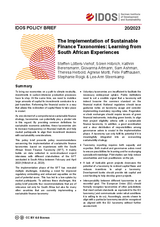Policy Brief
The implementation of sustainable finance taxonomies: learning from South African experiences
Lötters-Viehof, Steffen / Sören Hilbrich / Kathrin Berensmann / Giovanna Artmann / Sam Ashman / Theresa Herbold / Agnese Monti / Felix Paffhausen / Stephanie Roigk / Lee-Ann SteenkampPolicy Brief (20/2023)
Bonn: German Institute of Development and Sustainability (IDOS)
DOI: https://doi.org/10.23661/ipb20.2023
see also
The implementation of sustainability taxonomies: the case of South Africa
(Discussion Paper 15/2023)
To bring our economies on a path to climate neutrality, investments in carbon-intensive production processes have to stop. At the same time, we need to mobilise large amounts of capital for investments conducive to a just transition. Reforming the financial sector in a way that allows this redirection of capital flows to take place is crucial.
As one element of a comprehensive sustainable finance strategy, taxonomies can potentially play a pivotal role in this regard. By providing common definitions for sustainable economic activities, these taxonomies aim to increase transparency on financial markets and help market participants to align their investment decisions with sustainability considerations.
This policy brief presents policy recommendations concerning the implementation of sustainable finance taxonomies based on experiences with the South African Green Finance Taxonomy (GFT). It mainly builds on data collected in semi-structured expert interviews with different stakeholders of the GFT conducted in South Africa between February and April 2023 (Hilbrich et al., 2023).
The implementation phase of the GFT has revealed multiple challenges, including a need for improved regulatory embedding and enhanced capacities on the part of potential users. This has led to a low uptake by market participants. To address these challenges, this policy brief presents four recommendations that are of relevance not only for South Africa but also for many other countries that are currently implementing a sustainable finance taxonomy:
- Voluntary taxonomies are insufficient to facilitate the necessary widespread uptake. Public institutions need to set a credible signal that a taxonomy will indeed become the common standard on the financial market. National regulators should issue guidance notes on taxonomy usage and consider implementing mandatory reporting rules. Regulators or stock exchanges should require issuers of green financial instruments, including green bonds, to align their project eligibility criteria with a sustainable finance taxonomy. In addition, a good coordination and a clear distribution of responsibilities among governance actors is crucial in the implementation phase. A taxonomy can only fulfil its potential if it is meaningfully integrated into an overarching sustainability strategy.
- Taxonomy reporting requires both capacity and expertise. Both market and governance actors need to ensure possibilities for learning and for exchanging specialised knowledge. Pilot studies can help reduce uncertainties and train practitioners on the job.
- A lack of bankable green projects decreases the potential of a taxonomy to redirect capital flows and reduces incentives to adopt a taxonomy. Development banks should provide risk capital and seed funding to help develop green projects.
- Interoperability between different taxonomies is an essential goal. The European Union (EU) should formally recognise taxonomies of other jurisdictions that meet certain standards as equivalent to the EU taxonomy (and communicate under what conditions it is willing to do so). Accordingly, assets shown to align with a particular taxonomy would be recognised as aligned with the EU taxonomy without further assessment.
Contact
Cornelia Hornschild
Publication Coordinator
E-mail Cornelia.Hornschild@idos-research.de
Phone +49 (0)228 94927-135
Fax +49 (0)228 94927-130
Alexandra Fante
Librarian/ Open Access Coordinator
E-Mail Alexandra.Fante@idos-research.de
Telefon +49 (0)228 94927-321
Fax +49 (0)228 94927-130





![[Translate to English:] Photo: Alexandra Fante, Bibliothekarin/Open Access-Koordinatorin](/fileadmin/_processed_/f/0/csm__c_Deutsches-Institut-fuer-Entwicklungspolitik_Fante_94ce4fa1ba.jpg)